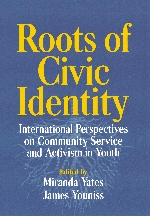Book contents
- Frontmatter
- Contents
- Preface
- List of Contributors
- Introduction: International Perspectives on the Roots of Civic Identity
- 1 Community Service and Political-Moral Discussions among Adolescents: A Study of a Mandatory School-Based Program in the United States
- 2 Social and Family Determinants of Community Service Involvement in Canadian Youth
- 3 Exploring Adolescent Altruism: British Young People's Involvement in Voluntary Work and Campaigning
- 4 Youth, Solidarity, and Civic Commitment in Italy: An Analysis of the Personal and Social Characteristics of Volunteers and Their Organizations
- 5 Political Socialization in the New States of Germany
- 6 Community Service and Social Cognitive Development in German Adolescents
- 7 Adolescents and the “Social Contract”: Developmental Roots of Citizenship in Seven Countries
- 8 Political Socialization in a Divided Society: The Case of Northern Ireland
- 9 Youth Experience in the Palestinian Intifada: A Case Study in Intensity, Complexity, Paradox, and Competence
- 10 Beyond the Call of Duty: The Service of Israeli Youth in Military and Civic Contexts
- 11 Recent Trends in Civic Engagement among Japanese Youth
- 12 Learning Politics in the Crucible: The Socialization of Taiwan High School Students as Citizens in a New Democracy
- Conclusion: Transcending Themes
- Author Index
- Subject Index
6 - Community Service and Social Cognitive Development in German Adolescents
Published online by Cambridge University Press: 04 August 2010
- Frontmatter
- Contents
- Preface
- List of Contributors
- Introduction: International Perspectives on the Roots of Civic Identity
- 1 Community Service and Political-Moral Discussions among Adolescents: A Study of a Mandatory School-Based Program in the United States
- 2 Social and Family Determinants of Community Service Involvement in Canadian Youth
- 3 Exploring Adolescent Altruism: British Young People's Involvement in Voluntary Work and Campaigning
- 4 Youth, Solidarity, and Civic Commitment in Italy: An Analysis of the Personal and Social Characteristics of Volunteers and Their Organizations
- 5 Political Socialization in the New States of Germany
- 6 Community Service and Social Cognitive Development in German Adolescents
- 7 Adolescents and the “Social Contract”: Developmental Roots of Citizenship in Seven Countries
- 8 Political Socialization in a Divided Society: The Case of Northern Ireland
- 9 Youth Experience in the Palestinian Intifada: A Case Study in Intensity, Complexity, Paradox, and Competence
- 10 Beyond the Call of Duty: The Service of Israeli Youth in Military and Civic Contexts
- 11 Recent Trends in Civic Engagement among Japanese Youth
- 12 Learning Politics in the Crucible: The Socialization of Taiwan High School Students as Citizens in a New Democracy
- Conclusion: Transcending Themes
- Author Index
- Subject Index
Summary
This chapter addresses German youth's participation in community service in four steps. First, it relates the German system of market economy to some of the special characteristics of community service in this country after unification. Second, it discusses possible effects of community service on adolescents’ development. Third, it presents an empirical study that is based on the idea that community service may have positive effects on adolescent identity formation and improve adolescents’ understanding of societal structures. The chapter closes with some reflections about the context of community service for adolescent development in German society.
Community Service in Germany
The concepts of “community service” and “volunteering” used interchangeably in this chapter do not have exact equivalents in the German language. The expressions gemeinnuetzige Taetigkeit and soziales Ehrenamt come closest. They traditionally describe voluntary and continuous unpaid work within an organization that is performed in the interest of others during one's spare time, the soziales Ehrenamt having a higher degree of organization and obligation (Gaskin, Smith & Paulwitz, 1996; Oik, 1992). In the last years, structural changes in the meaning of the two concepts weakened the foregoing criteria. Financial rewards are diverse and include expenses and pocket money. Community service activities in Germany also have a strong leisure component and only some are designed for direct promotion of public interests. And the voluntary criterion applies to most but not all cases meant by the two terms. For instance, “civil service” in 1998 is a 13-month engagement in social work as an alternative to 10-months obligatory military service for young males.
- Type
- Chapter
- Information
- Roots of Civic IdentityInternational Perspectives on Community Service and Activism in Youth, pp. 114 - 134Publisher: Cambridge University PressPrint publication year: 1998



